Kevin Clarke
Operetta Research Center
2 August, 2019
The one-act l‘île de Tulipatan, written by Jacques Offenbach with his librettists Henri Chivot and Alfred Duru in 1868 for the Théâtre de Bouffes-Parisiens, is one of “the most widely successful” of Offenbach’s mini opéra-bouffes. With a substantial career in the English speaking world.
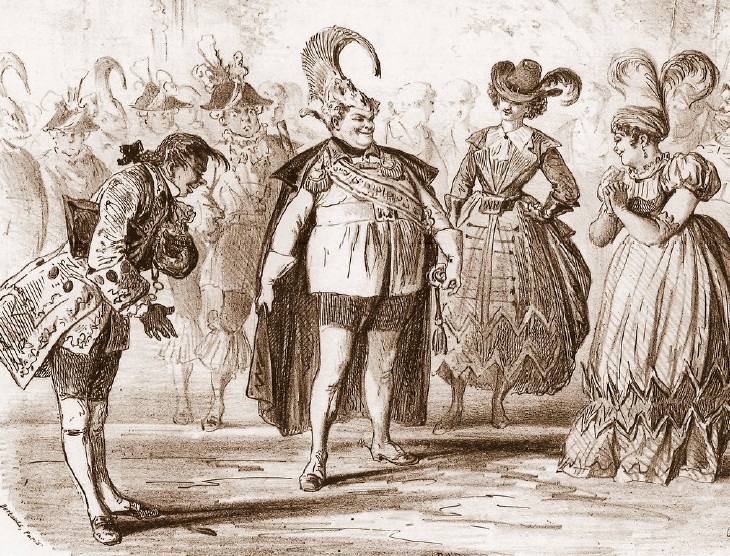
Sheet music for a quadrille from Offenbach’s “L’île de Tulipatan.”
Originally, the zany story is “extravagantly” set on the island of Tulipatan, “24,000 sea-miles from Nanterre, 473 years before the invention of the spittoon,” as Kurt Gänzl tells us in his Encyclopedia of the Musical Theatre. There, in that far-away place, Alexis, son and heir of King Cacatois XXII (a role created by Offenbach’s star comedian Berthelier), turns out to actually be a girl whom the seneschal, Romboïdal, has had brought up as a boy for dynastic reasons. Hermosa, Romboïdal’s daughter, on the other hand, is a boy whom his mother, Théodorine, has brought up as a girl to avoid military service.
Things get very out of hand when Alexis and Hermosa fall in love with each other – and when Romboïdal tells his daughter that she cannot marry Alexis because the crown prince is a girl. Hermosa tells her flabbergast father that she doesn’t care, out of which develops a duet about the joys of a potential same-sex marriage. The father weeps almost all the way, while Hermosa goes off into a victorious yodel cabaletta. A little earlier, the ultra-butch Hermosa taught the super-soft Alexis how to be more “manly” and to seduce women-with-shot-guns properly. Offenbach pulls out all the stops for this ra-ta-ta-plan-plan-plan-duet about the absurdities of gender roles sending both characters into the battle of the sexes with a hilariously rolled “rrrrrrrrrrrrrrrrrrrrrrrrrrrrrr” to illustrate the militant side of such a debate.
Given our current climate of often very militant gender debates and radical activism to blow up gender binaries, not to mention to issue of same-sex marriage, it’s not surprising that The Island of Tulipatan has experienced a tremendous revival in the past few years. The latest new production is due in Belfast at Northern Ireland Opera.
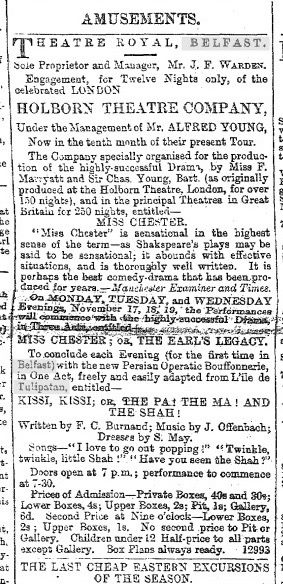
A newspaper clipping announcing the Belfast production of “Kissi, Kissi; or: The Pa! The Ma! And the Shah!” in 1873.
You might be surprised to hear that Tulipatan already played in Belfast as far back as 1873. It was brought to Ireland in the British version by F. C. Burnand under the title Kissi, Kissi; or: The Pa! The Ma! And the Shah!
That’s more or less the title used in Britain where Tulipatan first played in Leeds, then at the Opera Comique in London, subtitled “a Persian operatic bouffonerie.”
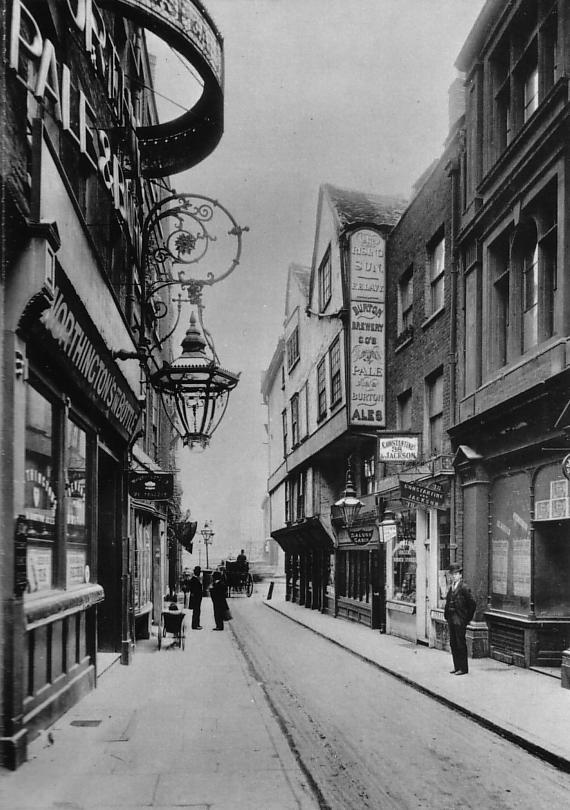
A 1901 postcard of Wych Street, in London-Westminster, where the Opera Comique opened in 1870. It was demolished in 1902 to make space for the construction of the Aldwych and Kingsway. (Photo: Wikipedia)
In this version both Alexis and Hermosa were played by actresses, in an English burlesque fashion that eliminates the particular charm of this show. As Kurt Gänzl said in a recent email to the author, English burlesque was “FCB’s favorite area, he never mastered opéra-bouffe.”
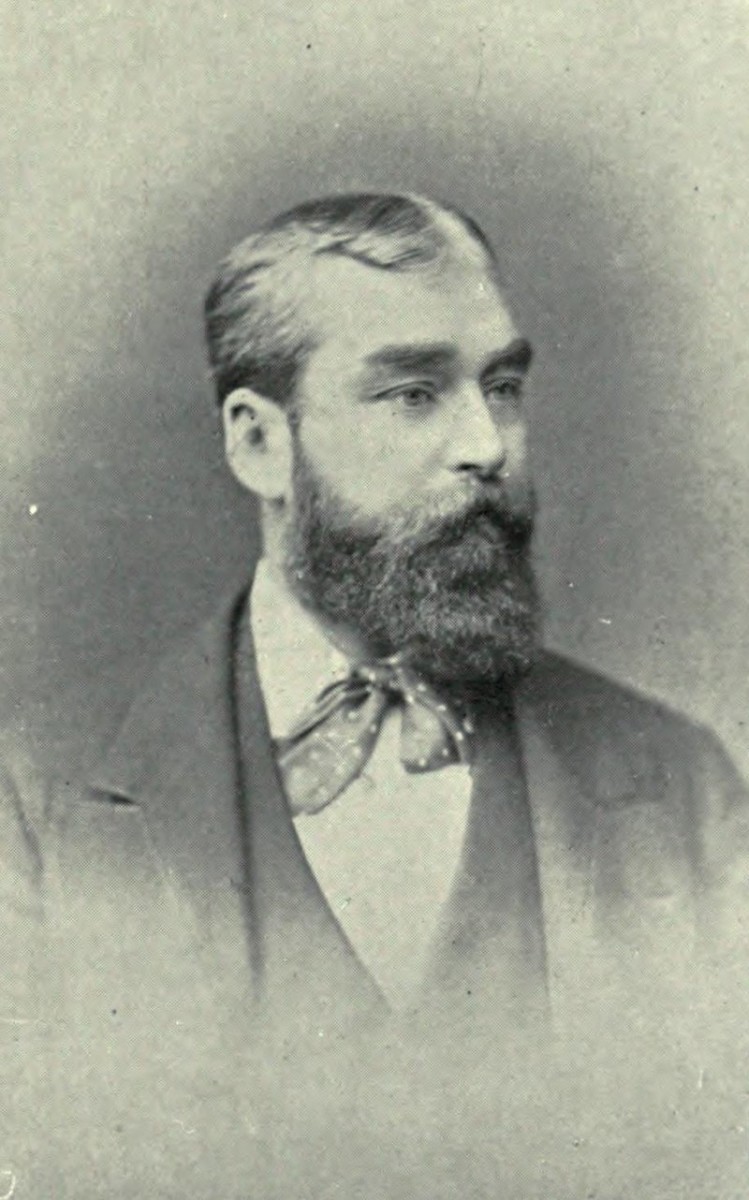
F. C. Burnand in the 1870s.
Of course you will wonder what the “Persian” aspect might be and what the “shah” is doing in this Tulipatan adaptation. He has taken over the role of King Cacatois XXII from the French original, inspired by the visit of the real Shah of Persia to London when the piece was produced there. In an article by Kurt Gänzl we read: “Henri Corri was cast as the comic father in the affair, Padishah Doo Deen, which he played as a burlesque of the Persian visitor. He caused a sensation. Thereafter, Henri Corri was obligatory casting for any operatic oriental potentate. When Liverpool couldn’t get him, they hired nephew Haydn. He went out on a long Frank Musgrave tour playing Mourzouk in Giroflé-Giroflà, and he played the enlarged title role in The Sultan of Mocha in Manchester and at the St James’s Theatre (1876), as his performing career wound down.”
Mr. Corri seems to have also come to Ireland, at least the Coleraine Chronicle of 1873 states about Kissi, Kissi: “An insignificant play performed at a third-rate house by a third rate actor (H. Corri), who bears a strong resemblance to the Persian monarch, has been quite successful.”
Ah, the secrets of success in a religiously ultra-conservative society! (Of course they didn’t officially like the gender bending story of this show.)
A year later, Kissi, Kissi also played at the Gaiety Theatre in Dublin. This time round the Irish Times remarked: “Should people desire to see an ‘operatic absurdity’ as Kissi, Kissi is termed in its most complete and highly humorous character should not omit the opportunity of witnessing the performance at the Gaiety.” (Thank you, Judith Wiemers for finding these two articles.)
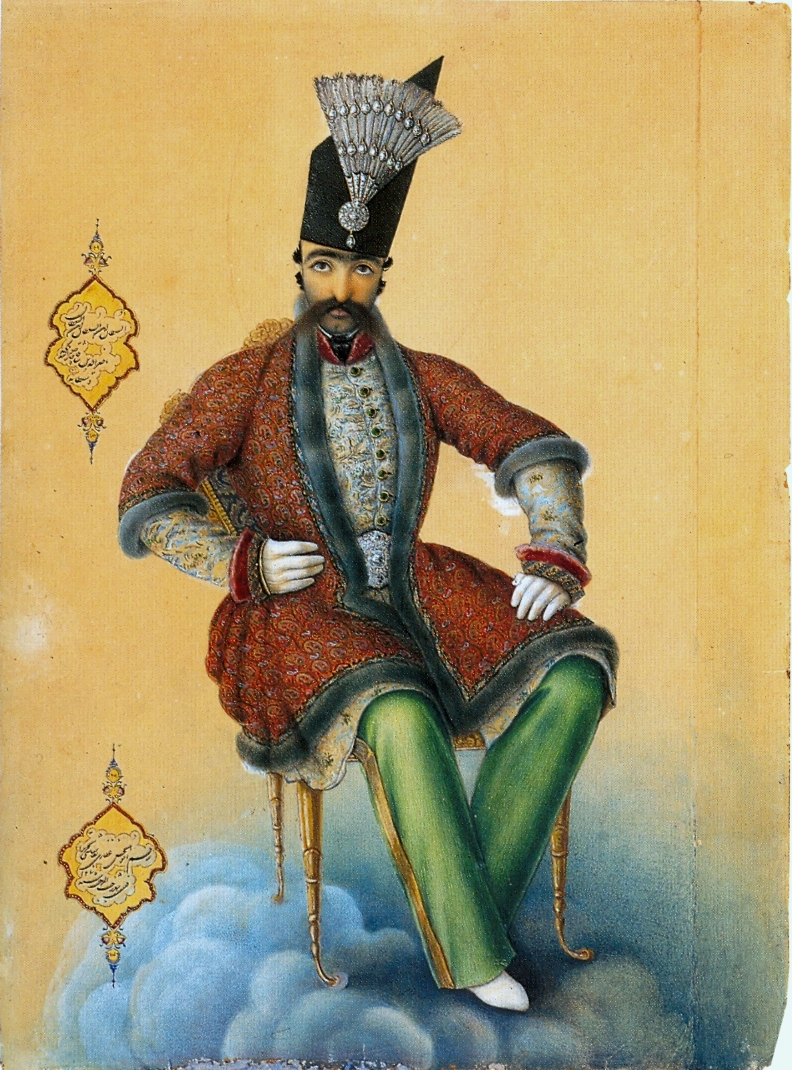
Naser al-Din Shah in 1854. He was the King of Persia from 1848 to 1896 when he was assassinated. (Photo: Wikipedia)
When Kurt Gänzl pointed out the “shah” side of things to me, I couldn’t help but wonder how the Tulipatan/Kissi, Kissi story would play out if we imagine it set in today’s Persia – in the world of contemporary Iran. As you might know, homosexuality is criminalized there, yet arrested homosexuals can escape a death penalty by agreeing to a sex change operation which the government pays for. Because trans people are accepted, on paper at least, so long as they stick to a heterosexual “lifestyle” supposedly demanded by The Koran.
How would the story of Alexis and Hermosa work under such circumstances, in which both teenagers are forced by society to accept strict gender roles and conventions that they feel are not fitting for them? How would the possibility of a same-sex marriage shock Hermosa’s father under such circumstances, considering that he’s not just a father but also a political official whose family affairs are very much in the public eye? And how would the religious and polictical ruler of Persia react to his son and heir turning out to be a woman? (Not to mention the way his character deals with unwanted critical press, in the famous “Couplets du canard.”)
I have not read the F. C. Burnand version of the libretto. And I doubt that Northern Ireland Opera will use the “Persian” aspect of the show, that the 1873 production brought to Ireland, for their upcoming staging which they are promoting with the colors of the trans rights flag.
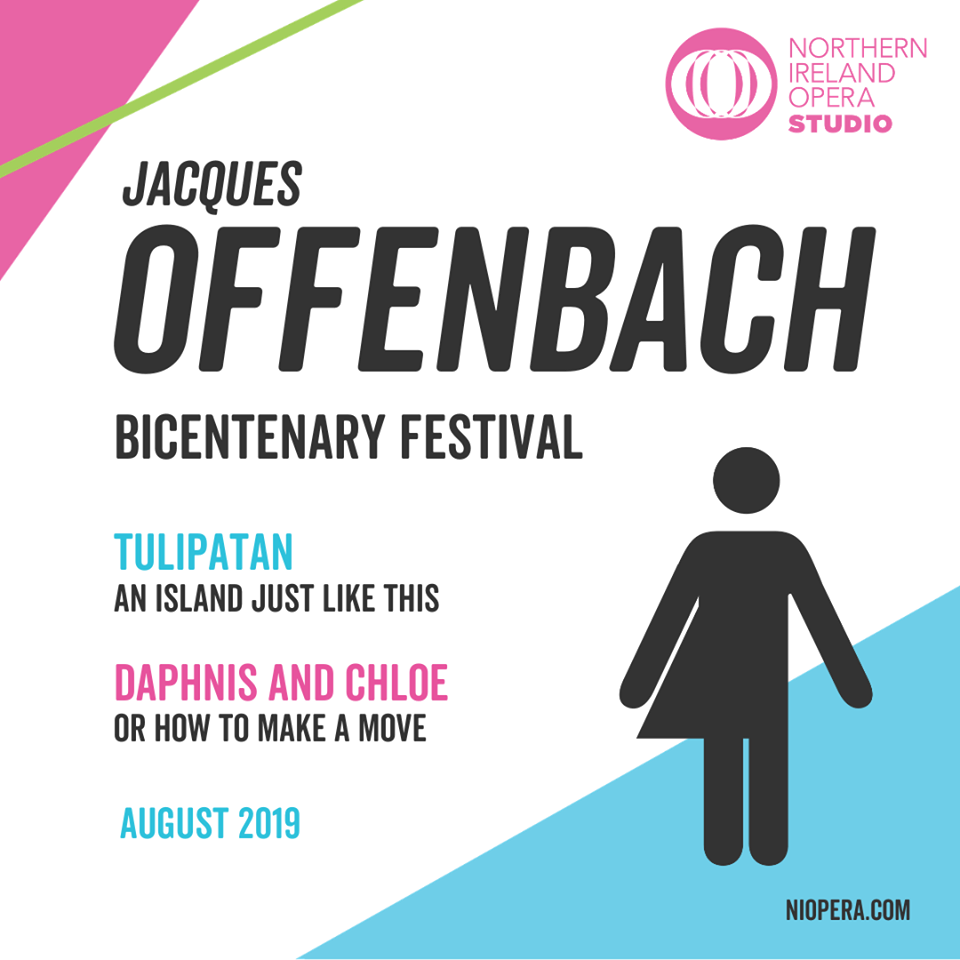
Poster for Opera Northern Irelands “Offenbach Bicentenary Festival,” 2019.
When the Light Opera of New York (LOONY) performed and recorded Tulipatan recently, they based their production on a modern English translation by Gregg Opelka and Jack Helbig, created in 2003: with no shah in sight and with no nod at gender conventions/regulations in the Muslim world.

Tom Mulder as Hermosa (l.) with her father, Chad Kranak as Grand Marshall Romboidal, in “L’ile de Tulipatan,” 2017. (Photo: Keith Butler/LOONY)
Of course, playing with such conventions/regulations today – and certainly as someone from “The West” – can be deeply problematic, especially if you make hilarious fun of such conventions, as Offenbach/Chivot/Duru do. Who would be “allowed” to take on such a job? A female or trans or a gay stage director from Persia who now lives outside of Iran and might want to tackle such a project, maybe showing how relevant many of the operetta’s themes still are from a deeply conservative and religious society’s point of view? It would probably be very different to a slapstick production by a Western theater company such as LOONY or Northern Ireland Opera.
Could such a production play in today’s Arab world? On the other hand, would it be okay to present such a “Persian” production in Belfast, or Berlin, or elsewhere, without being accused of Islamophobia and racism, if a white Western audience laughs at the supposedly “backward” ways of such a society? Is that why Chivot and Duru set their story “24,000 sea-miles from Nanterre” and “473 years before the invention of the spittoon,” to avoid any such problems?
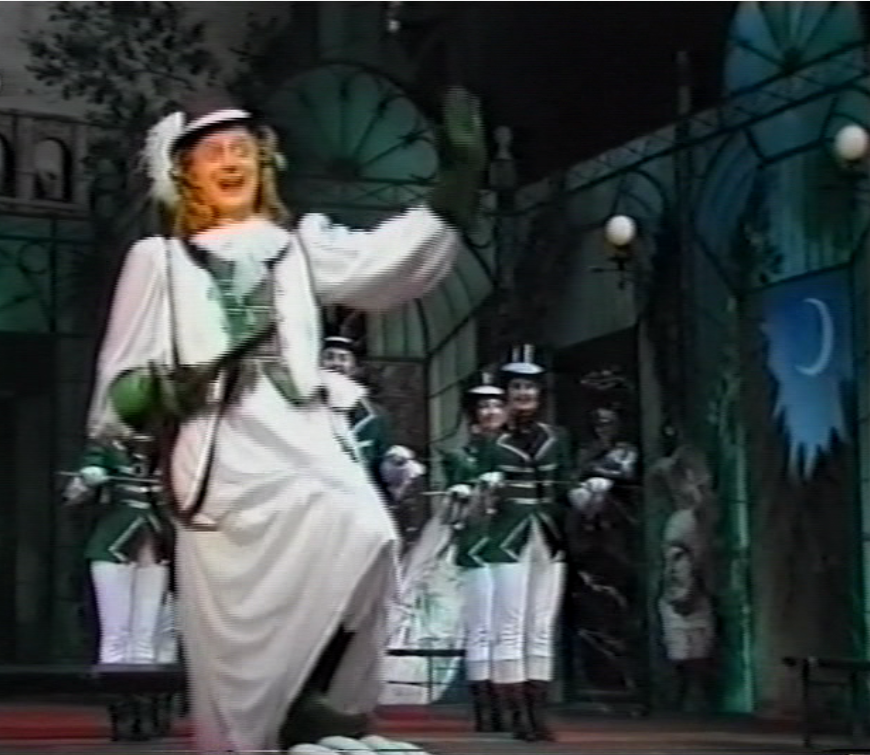
Peter Menzel as Hermosa in “Die Insel Tulipatan,” 1982. (Screenshot)
If you wish to see and hear the show in a German version, there is the 1982 TV live broadcast from Staatsoper Unter den Linden. It’s as zany as it can get, a production from socialist East Germany where the political jokes concerning Cacatois XXII take on an eerie dimension that adds another layer of meaning to the story. (You’ll notice the strange laughs from the audience.)
Sadly, LOONY only issued a CD, not a DVD. And Opera della Luna did not film their recent production either.
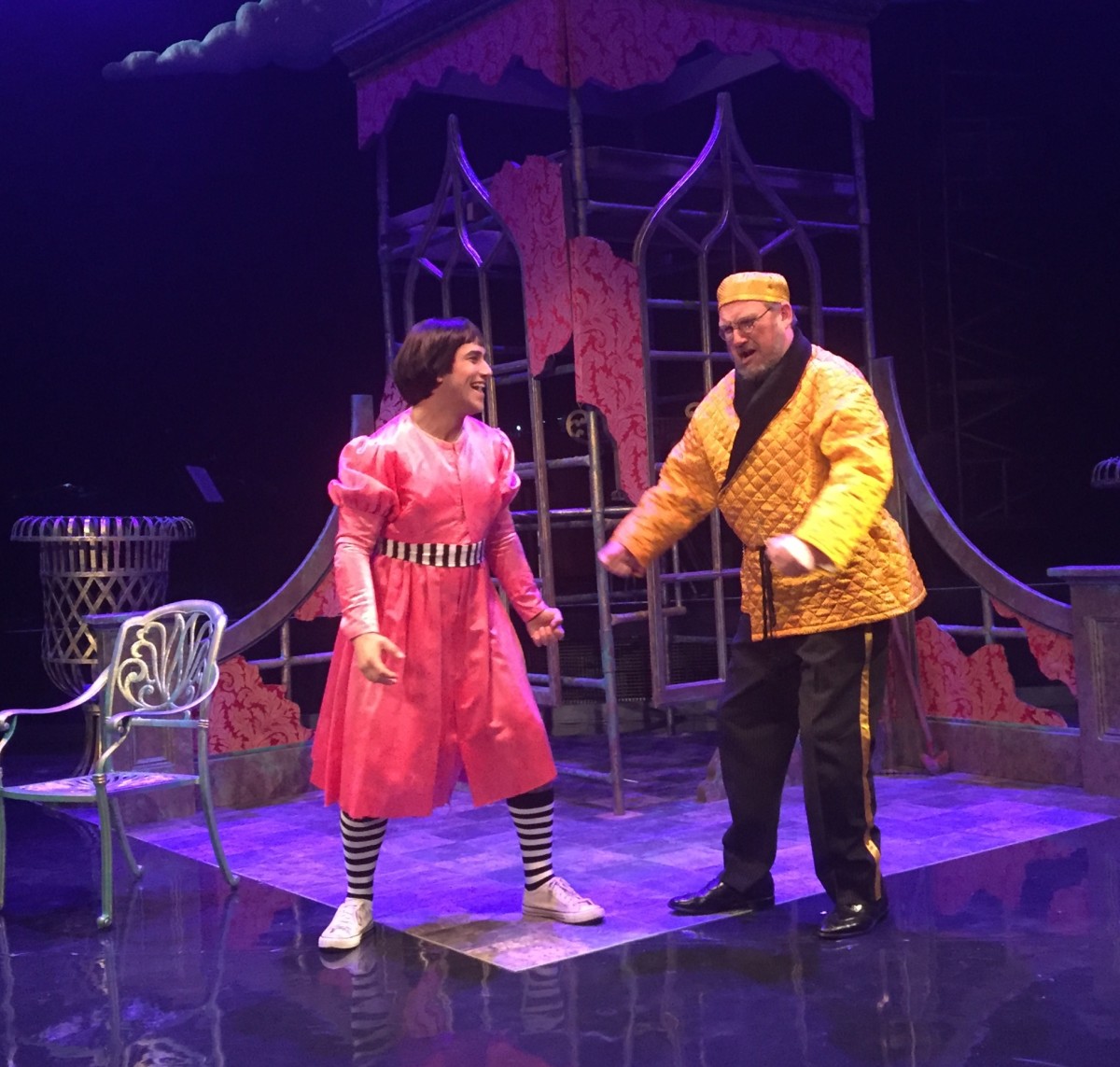
The father trying to convince his daughter that “she” cannot possibly marry another woman, in “The Isle of Tulipatan.” (Photo: Opera della Luna)
Maybe some Offenbach researcher will find the F. C. Burnand libretto in a British archive and edit it, giving modern theater goers another chance to think about this unique show. I, personally, would love to read an article about The Pa! The Ma! And the Shah! from an LGBTIQ activist in the Muslim world outlining perspectives that might have been overlooked or ignored so far.
In his recent book Jacques Offenbach and the Making of Modern Culture Laurence Senelick examines the career of various Offenbach pieces outside of Europe, e.g. The Grand Duchess of Gerolstein in Japan. Sadly, Mr. Senelick doesn’t give examples of far-away productions of Tulipatan. (He mentions the Karl Kraus version.)
Kurt Gänzl does go to the other end of the world in his Encyclopedia, mentioning an Australian version of 1886 that played under the title Alexis in Melbourne. It was presented by Amy Horton’s burlesque company, with Miss Horton as Alexis. Whether there was a shah in there is not pointed out by Gänzl.But in an email he said: “The Alexis done in Australia was definitely FCB, but the Shah business was old hat and irrelvant by then, so ignored [by the press].” But Gänzl does quote a historical London newspaper saying that the Burnand version was “better received than anything ever produced at the Opera Comique.”
Obviously, the show had potential, then and now!

…Now I really want to do a double bill of The Pa! The Ma! The Shah! and Die Rose von Stambul!